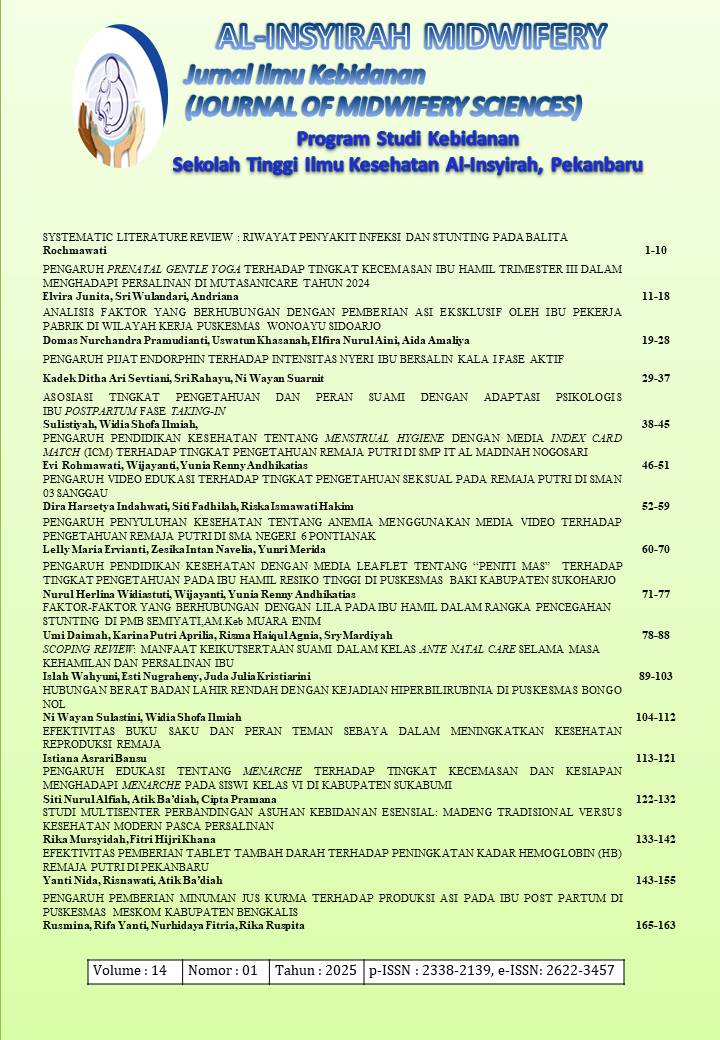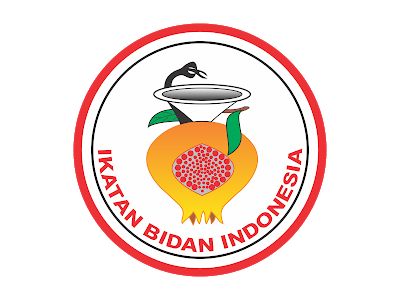ASOSIASI TINGKAT PENGETAHUAN DAN PERAN SUAMI DENGAN ADAPTASI PSIKOLOGIS IBU POSTPARTUM FASE TAKING-IN
DOI:
https://doi.org/10.35328/kebidanan.v14i1.2793Keywords:
Psychological Adaptation, Husband Role, Postpartum, Taking-in, Knowledge LevelAbstract
Postpartum mothers will experience increased vulnerability to effective disorders, it is postpartum blues. The results of preliminary study in January 2023 at Midwife's Independent Practice of Mamik Bululawang from 135 postpartum mothers, there were 82 primipara, 53 multipara mothers. of the 82 postpartum, 8 (9.8%) experienced postpartum blues, 5 (9.4%) of 53 multipara. The purpose was to analyze the association of knowledge level and husband's role with the psychological adaptation of postpartum mothers in the Taking-in phase. The design of observational research on correlation analysis with a cross-sectional approach. The study population is all primipara postpartum mothers on the first day who give birth at Mamik’s for the period from March to April 2023 totaling 43 people. A sample of 37 people, consecutive sampling. Data collection uses questionnaires, data analysis with multiple logistic regression tests. The results that the age of husbands, mothers were 20-35 y.o (86%, 68%); aboth education, namely high school (81.68%); the work of factory workers' husbands (43%), house wife (54%); husband's income >3 million (54%), length of marriage 1 year (54%); The level of husband knowledge is sufficient (49%), the role is good (62%), psychological adaptation (68%), the analysis obtained p=0.03<α0.05. Conclusion, there is a relationship between level of knowledge, role of husband with psychological adaptation of the mother in postpartum taking phase. The need for midwives to give health education periodically during ANC to husbands in preparation for birth, becoming parents is known an important role in reducing postpartum blues, especially primipara.
Downloads
References
Abdiyanti, L. S., Afriyani, L. D., Nafisah, Z., Sagita, C. D., Nababan, I. N., Christin, V., Martin, N., Pratnawati, S., & Tiara, M. (2021). Literatur Review: Pengaruh Dukungan Suami Terhadap Kejadian Postpartum Blues. Fakultas Kesehatan Universitas Ngudi Waluyo, 1, 90–95. https://jurnal.unw.ac.id/index.php/semnasbidan/article/view/825/590
Afrina, R., & Rukiah, N. (2024). Hubungan Tingkat Kelelahan dan Dukungan Sosial Suami dengan Baby Blues Maternal pada Ibu Pasca Melahirkan di Wilayah Bogor Selatan Tahun 2024. Jurnal Sains Dan Teknologi, 6(1), 148–157. https://doi.org/10.55338/saintek.v6i1.3346
Handayani, I., & Supliyani, E. (2021). Efektivitas Edukasi Psikologis Terhadap Dukungan Suami dan Postpartum Blues. Jurnal Riset Kesehatan Poltekkes Depkes Bandung, 13(2), 507–516. https://doi.org/10.34011/juriskesbdg.v13i2.1985
Hardjito, K., Antono, S. D., & Yani, E. R. (2017). Perbedaan Peran Ibu Primipara dan Multipara dalam Pengasuhan Bayi Baru Lahir. Jurnal Ilmu Kesehatan, 3(2), 12–19. https://doi.org/10.32831/jik.v3i2.53
Hikmah, N., Kartikasari, A., Russiska, R., & Noviyani, N. (2021). Faktor-faktor yang Berhubungan dengan Postpartum Blues di Wilayah Kerja UPTD Puskesmas Kadugede. Journal of Public Health Innovation, 1(2), 83–96. https://doi.org/10.34305/jphi.v1i2.279
Jannah, M., & Latifah, N. (2022). Literature Review: Faktor-faktor yang Mempengaruhi Adaptasi Psikologis (Postpartum Blues) Ppada Masa Nifas (Puerperium). Bhamada: Jurnal Ilmu Dan Teknologi Kesehatan (E-Journal), 13(1), 64–68. https://doi.org/10.36308/jik.v13i1.382
Maryuni, L. A. (2016). Faktor yang Berhubungan dengan Tingkat Pengetahuan Orangtua t entang Pendidikan Seks s ecara Dini pada Anak Sekolah Dasar ( SD ) Factors Correlated with Parents Knowledge about Early Sex Education for Children in Primary School. Junral Ners Dan Kebidanan Indonesia, 4(3), 135–140.
Nurmala, I., Rahman, F., Nugroho, A., Erlyani, N., & Laily, NurAnhar, V. Y. (2018). Promosi Kesehatan. Airlangga University Press. https://repository.unair.ac.id/87974/2/Buku Promosi Kesehatan.pdf
Olii, N., Salman, S., Abdul, N. A., Astuti, S. C. D., Porouw, H. S., Mohamad, S., Claudia, J. G., & Astuti, E. R. (2023). Literature Review: Determinants of Postpartum Blues. Jurnal Aisyah: Jurnal Ilmu Kesehatan, 8(S1), 57–62. https://doi.org/10.30604/jika.v8is1.1688
Pratiwi, L., Mahmud, U. H., Astuti, H. P., & Nawangsari, H. (2024). Associations of Husband Support with the Incidence of Post Partum Blues in the Working Area of Development Health Center and Tarogong Health Center Garut District. International Journal of Health and Social Behavior, 1(3), 1–7. https://international.arikesi.or.id/index.php/IJHSB/article/view/41
Purwati, A. indah, Fitria, N., & Aifa, W. E. (2023). Faktor-faktor yang Mempengaruhi Kejadian Postpartum Blues di BPM Elizabet Wilayah Kerja Puskesmas Payung Sekaki. Health Care: Jurnal Kesehatan, 12(1), 171–176. https://doi.org/10.36763/healthcare.v12i1.335
Puswati, D., & Suci, A. (2019). The Relationship of Husband Role on Psychological Adaptation Levels of Postpartum Mother in Camar 1 Arifin Achmad Hospital Riau Province. KnE Life Sciences, 4(10), 103–109. https://doi.org/10.18502/kls.v4i10.3834
Rasmi, N. K. G., Yusiana, M. A., & Taviyanda, D. (2018). Adaptasi Psikologis Ibu Postpartum (Fase Taking- in) di Rumah Sakit. Jurnal Penelitian Keperawatan, 4(2), 158–167. https://doi.org/10.32660/jurnal.v4i2.326
Rosa, E. M., Apriyanti, P., & Astuti, D. A. (2021). Husband’s Support in The Taking-Hold Phase of Postpartum (Phenomenology Study). Open Access Macedonian Journal of Medical Sciences, 9(T4), 97–100. https://doi.org/10.3889/oamjms.2021.5761
Setyaningrum, D. T., Metra, L. A., & Sukmawati, V. E. (2023). Postpartum Blues Pada Primipara (Ibu Dengan Kelahiran Bayi Pertama). Jurnal Kesehatan Mahardika, 10(1), 27–34. https://doi.org/10.54867/jkm.v10i1.158
Sugiarti, T. L. (2019). Hubungan Perilaku Caring Petugas Kesehatan Dengan Kemampuan Adaptasi Psikologis Ibu Post Partum di Ruang Dahlia RSD dr. Soebandi Jember [Unmuh Jember]. http://repository.unmuhjember.ac.id/7470/1/Artikel.pdf
Downloads
Published
Issue
Section
License
Copyright (c) 2025 Al-Insyirah Midwifery: Jurnal Ilmu Kebidanan (Journal of Midwifery Sciences)

This work is licensed under a Creative Commons Attribution 4.0 International License.














